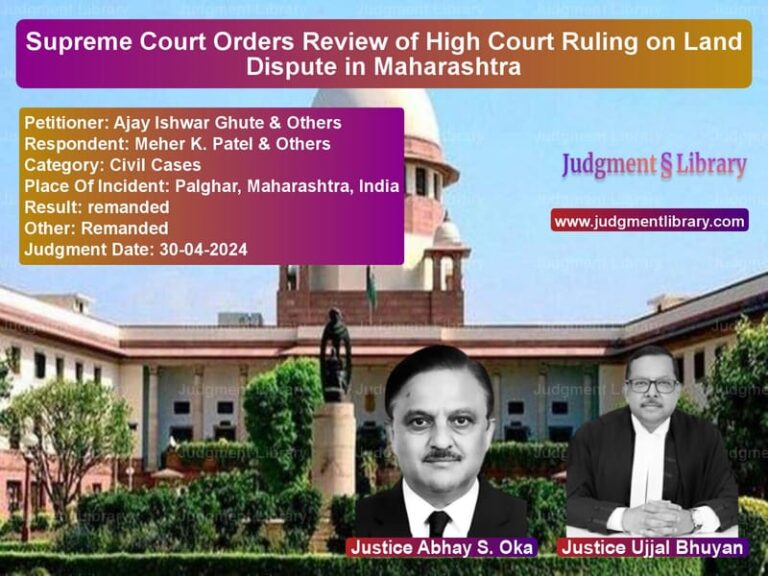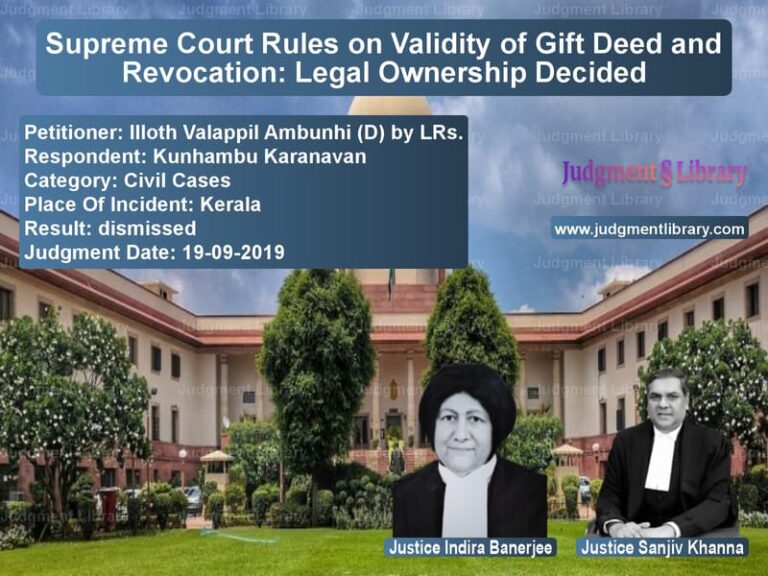Supreme Court Overturns High Court Ruling on Compassionate Appointment: A Case of Service Jurisprudence
The Supreme Court of India recently adjudicated on a crucial service matter in The Secretary to Government, Department of Cooperation, Food and Consumer Protection & Ors. vs. A. Kingston David. The case revolved around a dispute regarding compassionate appointment, where an individual appointed to a lower post sought retrospective elevation to a higher post. The Supreme Court, in its judgment, overturned the High Court’s decision, reaffirming principles of service jurisprudence.
Background of the Case
The case stemmed from a plea by A. Kingston David, whose father, a Senior Inspector in the Animal Husbandry Department of Tamil Nadu, passed away while in service on March 29, 2002. Following his father’s demise, the respondent applied for a job under the compassionate appointment scheme.
Due to administrative constraints, direct recruitment in the Junior Assistant post had not taken place between 2001 and 2006. The Tamil Nadu government had a policy, outlined in G.O. Ms. No. 154 (Personnel and Administrative Reforms Department) dated September 19, 2006, which stated that only 25% of the vacancies in the Junior Assistant category could be filled through compassionate appointment.
At the time of the application, the respondent was 49th in the state-level seniority list for compassionate appointments. Due to the lack of vacancies in the Junior Assistant post, he was given an option to either wait for a future vacancy or accept a position as a Record Clerk, a lower post. On June 23, 2010, he accepted the post of Record Clerk and provided an undertaking that he would not claim the Junior Assistant post in the future.
The respondent joined as a Record Clerk in the office of the Joint Registrar of Cooperative Societies, Sivagangai region, on January 19, 2011. However, after securing the position, he later filed a writ petition demanding revision of his appointment to Junior Assistant, claiming that he should have been offered the post from the beginning.
Legal Issues Raised
- Whether the government had a duty to find a vacancy for the respondent in the Junior Assistant post.
- Whether the respondent’s acceptance of the Record Clerk post and his written undertaking estopped him from claiming a retrospective appointment.
- Whether the High Court erred in directing the government to revise the respondent’s appointment retrospectively.
Petitioners’ Arguments
- The government argued that appointment on compassionate grounds is not a right, but a privilege granted under specified conditions.
- The respondent had voluntarily accepted the lower post with a written undertaking, thereby forfeiting any claim to a higher post.
- Under G.O. Ms. No. 154 (2006), only 25% of Junior Assistant vacancies were to be filled through compassionate appointment, and the respondent was low on the seniority list.
- Had the respondent waited instead of opting for the Record Clerk post, he would have had to wait several more years for a Junior Assistant vacancy.
- Granting retrospective revision would unfairly disadvantage others who adhered to the seniority-based system.
Respondent’s Arguments
- The respondent relied on G.O. Ms. No. 1499 (Labour and Employment Department) dated August 3, 1989, which directed authorities to not appoint dependents to lower posts if they were qualified for higher posts.
- He argued that the government failed to follow this policy, thereby denying him a rightful appointment.
- Had the government followed procedure, he could have been accommodated in a Junior Assistant vacancy in another department.
- Since he was eventually promoted to Junior Assistant, he contended that his service should be counted retrospectively from the date of his Record Clerk appointment.
High Court Ruling
The Division Bench of the Madras High Court ruled in favor of the respondent, directing the government to:
- Revise his appointment to Junior Assistant from the date of his original appointment as Record Clerk.
- Grant him subsequent promotions as if he had been a Junior Assistant from the start.
- However, no back wages were awarded.
The High Court’s decision was based on G.O. Ms. No. 1499 (1989), reasoning that the government should have attempted to find a Junior Assistant vacancy for the respondent instead of placing him in a lower post.
Supreme Court’s Verdict
The Supreme Court set aside the High Court’s ruling, siding with the government’s arguments. The bench, comprising Dr. D.Y. Chandrachud and A.S. Bopanna, held:
“The respondent took a conscious decision to avail of a public appointment on a compassionate basis by opting to secure an appointment to the post of Record Clerk. Having accepted the appointment, it was not open to the respondent to challenge his appointment and seek appointment as a Junior Assistant from the initial date of appointment.”
The Supreme Court emphasized:
- The respondent had voluntarily accepted the lower post and provided an undertaking that he would not claim the Junior Assistant post.
- The High Court erred in retrospectively granting him a post that he never occupied.
- Such an order would be unfair to others on the seniority list who chose to wait for Junior Assistant vacancies.
- The service jurisprudence does not permit treating service in one post as service in another for retrospective benefits.
The Supreme Court, therefore, dismissed the respondent’s petition while clarifying that his subsequent promotions, granted through normal channels, would not be affected.
Key Takeaways
- Compassionate appointment is not a matter of right: It is granted based on availability and government policies.
- Undertakings are legally binding: Accepting a lower post with a written undertaking prevents future claims for higher posts.
- Service jurisprudence protects fairness: Courts must ensure that retrospective benefits do not disadvantage other employees who followed due process.
- Government policy guidelines must be followed: The government must ensure proper application of policies such as G.O. Ms. No. 1499 (1989) when handling compassionate appointments.
The ruling serves as an important precedent in service law, reinforcing the principle that voluntary choices in employment must be honored, and retrospective benefits cannot be arbitrarily granted.
Petitioner Name: The Secretary to Government, Department of Co-operation, Food and Consumer Protection & Ors..Respondent Name: A. Kingston David.Judgment By: Justice D.Y. Chandrachud, Justice A.S. Bopanna.Place Of Incident: Tamil Nadu.Judgment Date: 10-12-2021.
Don’t miss out on the full details! Download the complete judgment in PDF format below and gain valuable insights instantly!
Download Judgment: the-secretary-to-gov-vs-a.-kingston-david-supreme-court-of-india-judgment-dated-10-12-2021.pdf
Directly Download Judgment: Directly download this Judgment
See all petitions in Recruitment Policies
See all petitions in Public Sector Employees
See all petitions in Employment Disputes
See all petitions in Judgment by Dhananjaya Y Chandrachud
See all petitions in Judgment by A. S. Bopanna
See all petitions in allowed
See all petitions in Quashed
See all petitions in supreme court of India judgments December 2021
See all petitions in 2021 judgments
See all posts in Service Matters Category
See all allowed petitions in Service Matters Category
See all Dismissed petitions in Service Matters Category
See all partially allowed petitions in Service Matters Category







